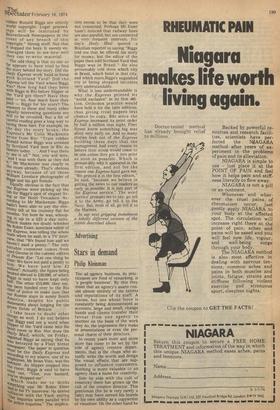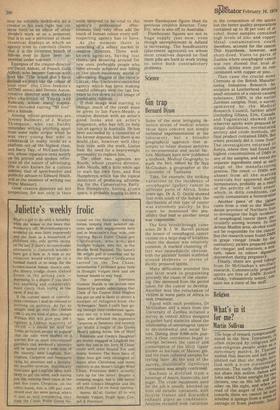Advertising
Stars in demand
Philip Kleinman
The ad agency business, its practitioners are fond of remarking, is 'a people business'. By this they mean that an agency's assets consist almost entirely of the talents and reputations of its staff. A truism, but one whose force is constantly being demonstrated as accounts, large and small, change hands and clients transfer their favour from one agency to another on the basis of the work they do, the impression they make at presentations or even the personal charm of their directors.
In recent years more and more store has come to be set by the role of agency creative departments, that is the chaps who actually write the words and design 'the visual effects that are supposed to influence consumers. Nothing is more valuable to an agency than a name for creativity.
Side by side with the cult of creativity there has grown up the cult of the creative director. This gentleman (for he is very rarely a lady) may have earned his laurels by his own ability as a copywriter or visualiser. On the other hand he may be entirely unknown as a creator in his own right but yet shine forth as an editor of other people's work or as a presenter, that is to say a performer at those theatrical displays at which an agency tries to convince clients that it is the cleverest bunch of fellows ever to have been assembled under one roof.
Examples of the creator-director are David Abbott, of French Gold Abbott, who became famous with lines like, "The board and I have decided we don't like the colour of your eyes" (for Clive Jenkins's ASTMS union) and Dennis Auton, creative director and nowadays also chairman of Young and Rubicam, whose many inspirations included cutting "St Ivel" into a hillside.
Among editor-presenters are Jeremy Bullmore, of J. Walter Thompson, who can hardly remember writing anything apart from some radio scripts when he was very young but who is celebrated in many lands as a platform wit of the highest class, and Barry Day, of McCann-Erickson, whose reputation rests mainly on his printed and spoken reflections on the nature of advertising. (He is also known for a curious sideline, that of speechwriter and publicity adviser to Edward Heath, still at the moment of writing our Prime Minister).
Good creative directors are hot properties; for not only is their work believed to be vital to the
agency's professional effectiveness, they very often add the touch of human colour every selfrespecting agency has to have.
At the moment there is something of a sellers' market in creative directors. Three wellknown agencies, having lost theirs, are scouting around for new ones, preferably people who have already achieved star billing in the show-businessy world of advertising. Biggest of the three is Lintas, the Unilever-controlled agency which has been making manful attempts over the last few years to live down its old image of predictable dullness.
If that image was starting to change, much of the credit must be given to Ian Fawn-Meade, a creative director with an actor's good looks and an actor's eloquence, who has left to help run an agency in Australia. He has been succeeded by a committee of his former deputies, but there is no doubt that, however well they may cope with the work, Lintas feels the need for a heavyweight personality to replace him.
The other two agencies are Royds, whose creative director, John NicolIs, left a little while ago to start his own firm, and Roe Humphreys, which has the topical distinction of producing advertising for the Conservative Party. Roe Humphreys, having grown apace, is probably hoping to hire a



































 Previous page
Previous page